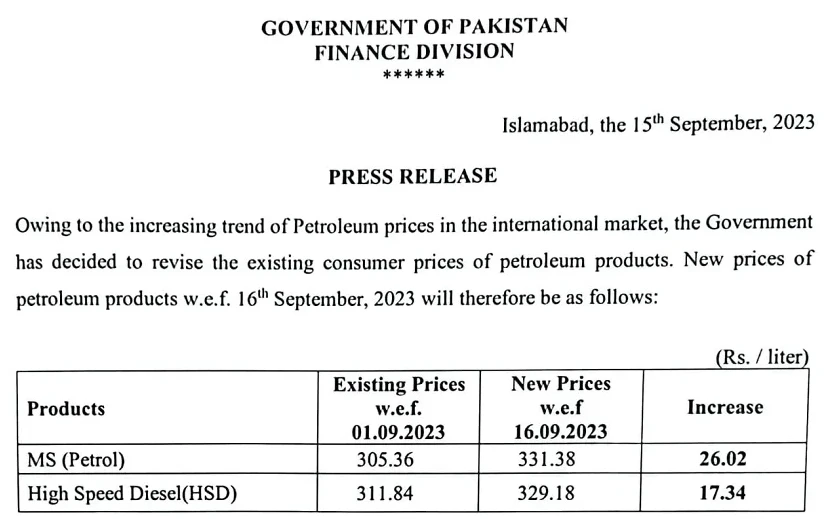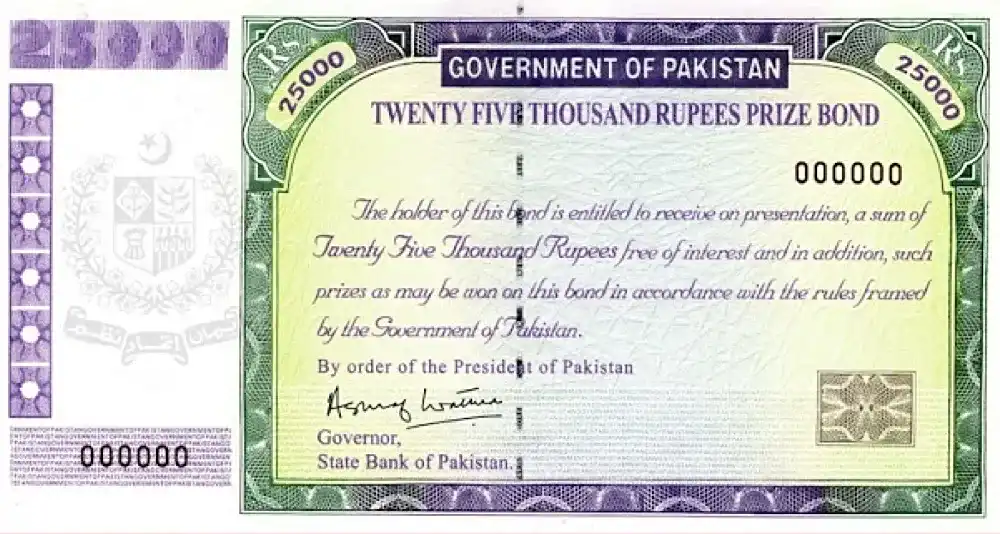Breaking News Petrol prices skyrocket by Rs26.02 per litre, HSD also sees a staggering rise of Rs17.34 per litre. The caretaker government announces shocking price hike. Petrol now at Rs331.38 per litre, HSD at Rs329.18 per litre. Stay informed.
The new prices for petroleum products have been announced for the latter half of September 2023, in Pakistan. The price of MS (Petrol) has seen a significant surge from Rs 305.36 per litre to Rs 331.38 per litre, marking a steep increase of Rs 26.02. Meanwhile, the cost of High-Speed Diesel (HSD) has also climbed from Rs 311.84 to Rs 329.18 per litre, up by Rs 17.34. This spells a steeper expenditure for consumers who rely on these fuels, as they will now need to pay more for their petrol and high-speed diesel requirements.
New Prices of Petroleum in Pakistan for September 16-30, 2023
| Product | Existing Prices (September 01-15, 2023) | New Prices (For September 16-30, 2023) | Increase |
| MS (Petrol) | Rs 305.36 | Rs 331.38 | Rs 26.02 |
| High-Speed Diesel (HSD) | Rs 311.84 | Rs 329.18 | Rs 17.34 |
- Petrol New Price: Rs 331.38 per litre increased Rs 26.02
- High-Speed Diesel New Price: Rs 329.18 per litreincreased Rs 17.34
Get ready to shell out more money for petrol and high-speed diesel (HSD) as their prices have soared to new heights. The Finance Division announced that the cost of petrol will increase by Rs26.02 per litre, bringing the new price to Rs331.38 per litre. HSD will also see a hike of Rs17.34 per litre, making it Rs329.18 per litre.

This is the second time in just a month that prices have been raised to historic levels. On September 1, the caretaker government raised prices by over Rs14 for both petrol and diesel.
Today petrol price in Pakistan per litre
| POLs | Current Price | New Prices (For September 16-30, 2023) | Price Difference |
| Petrol | 305.36 | Rs 331.38 | Rs 26.02 |
| Diesel | 311.84 | Rs 329.18 | Rs 17.34 |
This change in the prices of petrol and high-speed diesel is a reflection of the fluctuating global petroleum market. The increase of Rs 26.02 in petrol and Rs 17.34 in high-speed diesel is expected to have a ripple effect on various sectors of the economy, particularly transportation, and by extension, the cost of goods and services. The revisions in the prices are to take effect from September 16, 2023, and will remain in force till the end of the month. The Finance Division has reiterated that these adjustments are necessary, in line with the rising trends in international petroleum prices.
The Finance Division attributes the increase to the skyrocketing prices of petroleum in the global market along with the fluctuations in the exchange rate. Despite the recent appreciation of the rupee, it is not enough to offset the impact of rising global oil prices.
The government reviews and adjusts petroleum prices every fortnight based on the recommendations of Ogra. However, the final decision lies with the finance ministry. Sometimes they absorb part of the increase to provide relief to consumers.
It is worth noting that the government is obligated to raise fuel prices as per the agreement with the International Monetary Fund (IMF) under a $3 billion standby agreement.
Reports indicate that global oil prices hit a 10-month high on Friday, driven by Saudi Arabian production cuts and optimism about Chinese demand. US West Texas Intermediate futures rose by 0.7% to $90.78 a barrel, while Brent crude futures increased by 0.2% to $93.91 a barrel. The benchmarks are up approximately 4% for the week, reaching their highest levels since November 2022.
This recent surge in prices has sparked concerns among the citizens, especially those who rely heavily on these fuels for their daily commute or business operations. The increase will inevitably have a ripple effect on the overall economy, potentially leading to higher costs of goods and transportation. It’s a development that has left many wondering how it will impact their daily budget and overall expenses. As the international market dynamics continue to evolve, the people of Pakistan wait in anticipation of what the next fortnight will bring in terms of petroleum prices.
While the nation grapples with the impact of these soaring prices, various stakeholders, including transporters and agriculture sector representatives, have strongly criticized this decision. They argue that such a steep hike will only serve to fuel inflation and put additional burden on the common man. In the backdrop of these developments, it is likely that major transport unions may call for strikes, given that increased fuel prices directly affect their operational costs. Public sentiment is equally agitated, with many expressing their discontent over spiraling fuel costs on social media platforms. The government, meanwhile, maintains that it is making all necessary efforts to withstand global economic pressures and ensure the least impact on the general public. As we head into the second half of September 2023, it remains to be seen how these developments will unfold and what measures the government will take to mitigate the impact of this unprecedented price hike.




